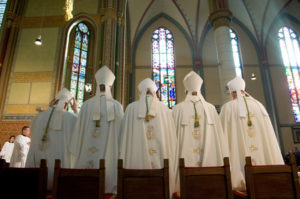 I recently attended a lay forum at a local Catholic parish and found what one might expect—a mixture of heartache, outrage, cautious expectation, and hope.
I recently attended a lay forum at a local Catholic parish and found what one might expect—a mixture of heartache, outrage, cautious expectation, and hope.
People spoke tearfully about the deep sadness they felt at the continuing revelations of abuse. This evil had occurred in the very Church that had taught them how to pray, administered the Sacraments to them, preached the Gospel, and deepened their relationship with Jesus. They respected, loved, and trusted the Church . . . and it had betrayed all of them as well as the abuse victims.
They spoke, as well, of their profound anger, not only at the abusers, but also at Church authorities. After all, they reasoned, the abusers’ despicable behavior was driven as much by troubled psyches and aberrant compulsion as by deliberately evil intention. On the other hand, the bishops and cardinals who hid the offenses and transferred the abusers to other parishes acted with the cold calculation that the Catechism describes as “full consent of the will.” And that fact makes their sin more despicable..
How, the people wondered, could the bishops—the shepherds of Christ’s flock—have abandoned that flock to those who would ravage them physically and spiritually and condemn them to a lifetime of shame and resentment? Did the bishops not pray for guidance when they learned about the abuse? Did they really believe the Holy Spirit wanted them to hide the disgusting behavior and enable the perpetrators to continue it? Did they not grasp that their silence made them complicit in the sins Jesus promised would receive even worse punishment than being thrown into the sea with a millstone tied around their necks.
Were the bishops stupid, callous, uncaring, or all three? The very question further outraged the people at the forum.
The people also expressed anger that millions of dollars they and others had donated to help the poor were used to pay for the sins of the abusers. The settlements, they realized, would not have been nearly so large had the bishops acted quickly and responsibly when they first learned of the problem. Why, then, should the laity continue to donate to such irresponsible custodians? One person remarked that no sensible person would give to a private charity that could not guarantee the donation would be used appropriately, so should they do any differently with the Church? Another suggested that the poor are better served, and Jesus’ command more honored, by donating to organizations that use the money wisely.
Beyond criticizing the Church for its handling of the sex-abuse scandal, those who attended the forum offered positive suggestions for how the hierarchy can regain the laity’s trust. One was for the hierarchy to support extending the states’ statutes of limitations so that abusers are no longer saved by the calendar. (Unfortunately, many bishops have done the reverse and opposed such extensions.)
Another suggestion was for bishops to remove themselves from the handling of abuse allegations altogether and instead refer them to law enforcement for investigation and, where appropriate, prosecution. Yet another was to be more transparent with the laity, not just in scandalous matters like sex-abuse, but more generally; moreover, to recognize that the Holy Spirit inspires not only the anointed but the laity as well, and, accordingly, to give the laity greater voice in the affairs of the Church.
Last and most encouraging was the hope demonstrated at the forum. Despite the heartache and resentment the people understandably felt, they made clear that the Catholic Church is their Church, they love it as they love the Lord, and they will not give up on it. I pray that their hope will inspire the hierarchy to seek genuine and meaningful reform.
Copyright © 2018 by Vincent Ryan Ruggiero. All rights reserved



